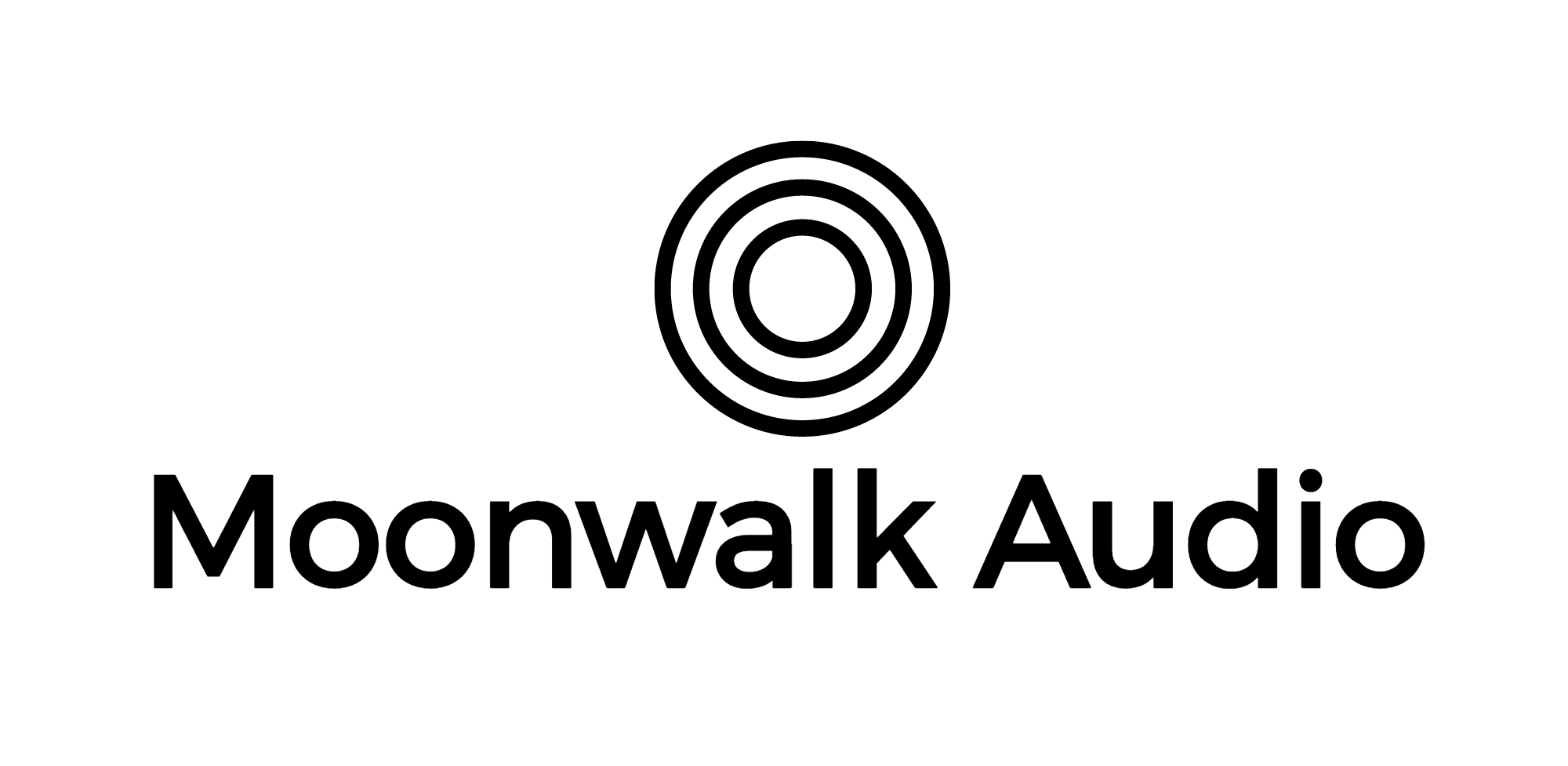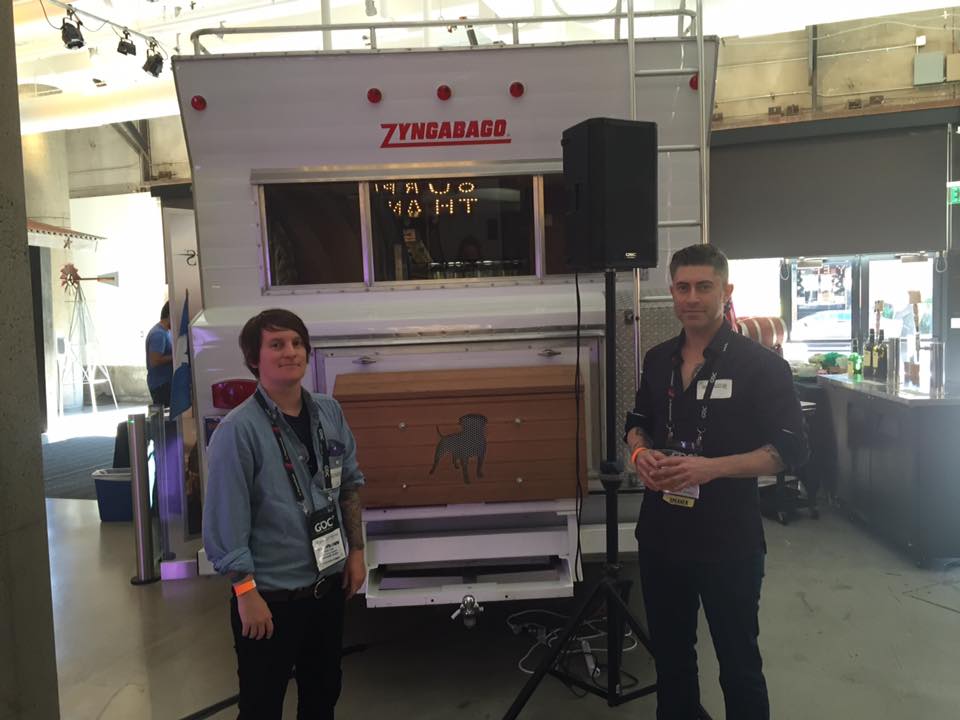
Sam Hughes speaks to Adam Gubman and Alex Cox from Moonwalk Audio! After Adam Gubman’s first game in 2006 (Pirates of the Burning Sea), he went on to score over 600 video games helping to establish the sound of many iconic downloadable, mobile, and casual titles while maintaining a solid career composing for various media projects. Gubman’s work can be heard in projects for notable clients like Disney, Zynga, Storm8, Sony, PlayFirst, GSN, GameHouse, NBC Today, and Warner-Chappell. He is known for his speed, creativity, and memorable melodic voice that brings unique branding to the projects he works on – he is passionate about all the projects that he touches, and delivers AAA quality no matter the project scope. He’s an avid gamer, father and husband. Adam operates out of Moonwalk’s LA location.
One of Alex’s first games was Zynga’s Roller Coaster Kingdom in 2009. Since then Alex has been Senior Sound Designer on over 400 games for many top industry developers, like Zynga, Disney, EA, Gree, Gamehouse, Big Fish, GSN, Playstudios, Storm 8,… Alex co-founded Moonwalk Audio in 2014 and continues as a sound designer as well as audio producer. She approaches every project with the same amount of care and creativity and is known for speed, collaboration, and making awesome sounds. Alex is also an animal lover, avid gardener, and works out of Moonwalk’s Oakland studio.
Check out a playlist of some of their work below:
Thanks for joining us, it’s really great to have you both on the site!
Before we begin discussing your most recent work on GameHouse’s Delicious series or BlueGiraffe’s Heart’s Medicine, tell us how each of your journeys into creating audio for games began?
ADAM – I’ve been writing music for games since 2006. I got my start on a Pirate themed MMO called “Pirates of the Burning Sea” for Flying Lab/Sony. It was good timing for me, having just finished my degree in composition, I remembered enough about writing fugues and traditional classical music to incorporate some of those ideas that POTBS demanded of me. Shortly after that, I started writing for casual games through a third party audio house, and they kept me very busy for a long time. Since going out on my own with Alex, and joining her endeavor as partner in MoonWalk Audio, we’ve been busier than ever!
ALEX- I’ve always wanted to be an audio engineer growing up and went to a sound arts program in college. We had to take some sound design and game audio classes and I loved them. I had an internship at a recording studio and one at the same game audio house where Adam worked at in Jan 2009. The game audio stuck with me and turned into a job, and I continued there until 2014. I worked on so many games and learned all about the business. Now we have Moonwalk Audio and things are awesome!
Was there any particular moment that was a key turning point or ‘big break’ that kickstarted your careers?
ADAM – I think it’s a combination of things, really. I’ve done a lot of work that no one knows belongs to me, and that isn’t great for my reputation or forward momentum. While I was ghosting for a third party audio house, I was busy writing music for Warner Chappell, Disney Parks, source music for major motion pics, NBC Today, etc – those credits actually helped propel my game audio career once I went truly indie with Alex. Despite my 8 years previously, I would have to say that the most important thing I’ve done for my career was to partner with her! Now, more than ever, we are choosing projects that truly reflect the audio styles we love, and we’ve both been super happy.
ALEX- Adam pretty much summed it up! I also worked on a ton of stuff with no name credits. Fortunately I met a lot of people and built connections. There was one early client that sort of helped us realize we could form our own company and owning a business was an option. That was a big moment for me. There was a good year and a half that we had Moonwalk and I was working another job. I was furiously writing emails to potential clients, like every day. The day I quit the other job was huge.
What has been the biggest challenge so far that you’ve each had to face, either composing music or creating sound design for a game?
ADAM – For me, the biggest challenge is always the moment of fear I feel before the first creative meeting – it’s the whole “imposter syndrome” thing, where I question my ability to see the next project through. My nerves always make me chatty, so I end up doing quite well in meetings, and that balances it out! The other common challenge I face is to help serve the game while doing something I love. Composers like to write what they want, but ultimately there are many more considerations that go into a project’s audio design, and much of that has to do with stuffing the ego and putting the game first.
ALEX- For me sometimes it can be hard to keep things creative and unique for each game. Game styles get trendy and art is so similar between games sometimes. I want to always be trying new ideas and techniques, but sometimes it’s a challenge when you already know what’s going to work and what the client probably wants.
What would you say has been the proudest moment of your careers so far?
ADAM – I have a ton of projects I’m super excited about currently, and in the past two years there have been some watershed moments that I’ve been thrilled about. Disney is one of my favorite clients. For them, I get to write songs, orchestrate, and arrange new and fresh versions of classic Disney tunes that I love. It is always such an honor to have access to the Disney Classics as part of the intertwining repetoir of the shows I write, and I treat the material with respect and reverence while trying to do something fun! Recently I got to do some music for the new Smurfs, and we have seven songs in the upcoming Baywatch re-boot, so I’m pretty proud of that as well.
The work we’re doing with GameHouse/BlueGiraffe (especially the upcoming Hearts Medicine 3!) has been one of our proudest to boot – They’ve seen our vision through to record vocal music and live orchestra for their mostly-mobile delivery IP’s, and we’ve pushed the limits of content and presentation to bring a more thoroughly cinematic experience to their story driven games. We’ve had great success implementing vocal music and songs that help move the story forward. Zynga has been a fantastic client for us, and we’ve done some work we’re really proud of for the Hit It Rich, Wonka and Oz franchises, working with the amazing audio team over there to increase the integrity of the audio choreography and presentation.
I’m also a super proud daddy to the score for the upcoming Elsinore game by Golden Glitch. I took a lot of time to explore what the sound and source music from the world of Hamlet would sound like, and wrote seven songs that intertwine throughout the game as part score part source part cinematic. Some lyrics address the themes of the game and story, but some are simply songs that I felt might be written about in that time (including a dark ballad about a man who falls in love with a corpse, performed beautifully by my great friend John Matz). Some of the games’ lyrics were co-written by the incredible George “The Fat Man” Sanger, and I utilized dozens of musicians to make this score come to life. The whole presentation is over an hour of music, and some of my best and most creative work ever – this was truly a passion project for me, and I can finally share some of the work with the general public despite the fact we’re a few months from release.
ALEX- Moonwalk is the my proudest moment of my career so far! I’m still like, is this real that I have a business and an awesome partner and we’re busy. On top of all these Gamehouse games, we have several others coming out this year that I am super proud of (Trailer Park Boys- Greasy Money and Office Space-Idle Profits just came out this week!) I feel like I’m pushing myself as a sound designer more and making some stuff I’m really happy with. We have a cool variety of games that we’re working on; space shooters, match 3s, mech fighting, battle cards, slots.. which feels really good to create such a variation of sounds effects.
In 2014 you guys founded Moonwalk Audio, could you tell us a little bit about how you ended up working together and what you both do at Moonwalk?
ADAM – Alex had started MoonWalk with another mutual friend, whom we both still work with occasionally. Things got busy for him, and Alex had been sending me some work to do. When I connected with Zynga in 2014, I brought Alex in to be my partner sound designer on all their projects. I so loved working with her that when she asked me to join her as partner in MoonWalk, it was a no-brainer. We really understand each other, and both have a similar approach to design and development. We put our clients first, and only take on projects we truly care about. I really believe that having a unified vision and clarity of mission makes the partnership strong, and we certainly have that!
ALEX- We definitely make a great team and it feels super easy. We can really trust each other to make great stuff and hustle when we need to. Along with all the awesome stuff we get to do, there’s quite a bit of paper work, accounting, and business development, the boring part of owning a game audio business. But we share all of these duties and then I also maintain our website which is fun for me.
So, Alex you’ve been quoted to have been senior sound designer on over 400 games and Adam as composer on over 600! How many games are you each often working on at any given time? And how do you balance your workloads?
ADAM – In years past (previous to MoonWalk), I had made the mistake of taking on way too much. Currently we have pushed our credits to well over 600, but we stopped counting, as now our focus is on content and quality – not amount of credits. Without discounting the wonderful developers and projects I got to work on before MW, the first few hundred titles I was really just “cutting my teeth” on, and now I feel like I’m gaining my stride. There are still a ton of things we’re still discovering about our workflow and what is possible to do with what developer, and I hope that feeling never goes away so I can continue learning and growing as a contract audio director and composer. In regards to balance, for me, it’s about managing milestone delivery and making sure I don’t overload my deadline dates. I do a lot of other things besides game audio, and I have to be sure I can give those projects attention as well, while having time to be creative in my process.
ALEX- Moonwalk is all I’m doing right now, besides the occasional editing side projects. We definitely keep ourselves busy, but things always work out nicely timing wise. We’re probably actively working on 5-10 games at a time. In the past it was practically a game a day, which is how we racked up that crazy number. That’s definitely not anything we’re interested in doing again.
Do you have any particular favourite game/s that you’ve worked on?
ADAM – Something I’m really interested in is exploring the SOUND of the world that games exist in. What I mean by that: What songs would the characters be listening to if we were to turn on the radio in their world, or hear a band at their local venue? I’ve been exploring this a lot, and the subsequent result is that I’ve been doing way more songwriting for games than ever. I love writing lyrics and helping to tell the story, so this is really important to my process. For that, I am SO enjoying working with GameHouse and Blue Giraffe right now. Out of all the developers I work with, their vision of audio and music is the closest to mine, and I get to write a lot of songs as well as compositions. They really allow me to spread my wings and explore different styles and live ensemble groupings, and are open to suggestions to how audio can effect and integrate in new and fun ways. I’ve had a ton of fun on Golden Glitch’s “Elsinore” as well – they were a bit hesitant about the amount of lyric driven songs I wrote, but we managed to find use for them! They’re a small developer and this is their first game, but I think we’re going to see amazing things from them in the future. Now a days, I’m pushing for songs so often, that the response from my developers is always at first a nervous laugh, then a resounding “no”, followed by a “wait let me show you how that would sound”, which often leads to an “ok, maybe that DOES work, let’s do it!”.
ALEX- I really like some of the Zynga games we get to do. It’s mostly slots, but there are a ton of well known licenses we get to work on. My favorite was Star Trek The Next Generation. I actually got to make cool weapon and Enterprise sound effects in the style of the show and even used some of the original sounds in my sounds.
On your site, you have a dedicated section for ‘casual games’, for those that might not know, would you mind explaining what a casual game is? And how does creating sound design and composing music for these games differ from bigger titles?
ADAM – Boy, this is a whole other interview wrapped up in one question! Casual Games used to be defined by the amount of hours players would spend on them. Games like Tetris, Bejeweld, Puzzle Quest, Plants vs Zombies – all pick up and play for a short while. Mobile delivery has changed that concept, and now people are spending upwards of 20 hours on some of our titles, so that forces us to re-define the genre. I would rather say “mobile” than “casual” nowdays, as there are quite a few pick-up-and-play titles for consoles as well, and more than a few hardcore shooters on the mobile platforms! There is also a musical connotation that surrounds the idea of “casual” as being more family adventure and comedy style, rather than aggressive action. This, also, is changing, so the whole concept of “casual” might be a dated concept. Take a look at a game like Fallout 4 or Witcher 3, or even Final Fantasy XV – while the stories are long and developed, there are many parts of the experience that are small pick-up-and-play events where the end user might be doing something like fishing, or a quick “kill this bad guy” quest that lasts 10 min. The draw to those games is the “casual” nature by which you might sit down and play for a short stint of time, but the overall experience is in no way “casual”.
ALEX- It looked confusing to have all of our projects together on our site, so I categorized them in the most sense I could make. But yeah I think for sound design, one big difference is the amount of assets and implementation. With casual we aren’t working with massive amounts of audio files and spending months on each game (usually). There’s also the musical aspect. With casual, a lot of the sounds need to be in key with the music and are pretty tonal. I like when I get to make my sounds while listening to Adam’s music.
You both worked on Blue Giraffe/GameHouse’s upcoming Heart’s Medicine: 3 and GameHouse’s upcoming yet to be titled Delicious 15 How different was it creating audio for each of these titles?
ADAM – Despite the similarity in gameplay for these two titles (time management), both developers do a fine job at letting the story and theme of the game separate each new release. I’ve done almost 16 titles for GameHouse over 10 years, and more than ever, they’re increasing the dramatic and cinematic presentation, quality of story, art, and music, and content/play styles. Directly, Heart’s Medicine is a heart wrenching hospital themed game, and buy lorazepam from india the Delicious series follows Emily as she grows up following her dream to become a chef (There are 14 of these titles, it’s quite a long mythos). Currently Emily is married, has a child, and still presents a wonderful relatable and meaningful experience through her games!
In composing for Heart’s Medicine, I teamed up with the wonderful Miranda Kalagian and Keeley Bumford to write five indie pop songs, a-la the popular TV show “Greys Anatomy”. We took a TV approach to the score as well, with very light and guitar driven music, somewhat dramatic and appropriate to a hospital style TV drama. We contracted a wonderful string quartet through FAMES in Macedonia, and did live drums and guitar. On this title, you’ll hear a deeper and darker score than the second installment, with a noticeable leap in production quality.
The music for the Delicious series has always been family adventure-magical, and we’re pushing the envelope even more so to incorporate songs and orchestra. Since MoonWalk took over production of the audio, we’ve done 30+ piece orchestra and live guitar (my good friend Jeff Askew plays on all the games) for most games – in the newest installment, the story is more intimate and delicate. I can’t get into it yet, but I made some choices about orchestration that directly reflect the nature of the story – lighter, smaller sounds, and again, a string quartet treatment (with different style than HM3, let me add). It serves the game really well, and I’m excited for you to hear it! This is the “most different” sounding Delicious score – the idea here being that the score should mature and grow as the characters do!
The wonderful thing about GameHouse – they are super inline with my general vision about writing more SONGS for games. Since I presented the concept to them a year or so ago, all of their satellite developers have also asked for songs – this is a wonderful devise for unifying the score and story, and I love the process.
We understand that you also had the opportunity to record a live orchestra and choir for the music of Delicious: Emily’s Christmas Carol (Delicious 14). Would you mind telling us a bit about this and how it came about?
ADAM – Before we had embarked on our journey with GameHouse, the owner expressed his interest in upping the quality of music for the game. We got some quotes from European orchestras (much more affordable) and he agreed that it is money well spent. We record remotely with FAMES Macedonia, and they have been very accommodating to our requests for specific instrumentation. Our brand manager at GameHouse has the same desire we do to incorporate more music and better presentation, so we’re constantly looking for ways to do that. Orchestra is the first logical step.
Is recording with live instruments common for casual games?
ADAM – No, it’s not, really. I’m surprised at this, as there are so many affordable options for composers to use live music in their work. Even if orchestra is out of budget, it would be in a composer’s best interest to utilize one or two live instruments in a score, to add the extra bit of believability and musicianship. Now days, I don’t do ANYTHING without live instrumentation. I’m always pushing my clients for an extra few hundred bucks here and there to cover costs, and when they don’t have it, I end up eating into my profits as it’s SUCH an important part of the way I work.
Do you have any particular favourite ‘go to’ plugins or sample libraries that you use consistently?
ADAM – I’m a big fan of anything by Eduardo Tarilonte. I buy most of his stuff. I’ve been using a lot of Sample Modeling with the Virtual Soundstage Plugin by Parallax, and adore the jazz brass sound I’m able to get. All the staple orchestral libraries are in my arsenal, with heavy hitters from Cinesamples, Spitfire, 8dio etc helping me be super creative. Lately I’ve adored the Output synths and Wide Blue Sound stuff as well.
ALEX- For libraries I love Boom’s stuff and A Sound Effect is great if you just need a small specific library for cheap. And then of course I try to record as much custom foley as possible. For plugins I still use Kontakt 5 all the time for sample variations.
If you could each go back in time and give yourself one piece of advice, what would it be?
ADAM – Balance. Pick projects you really love. Stick to your gut, and don’t go exclusive if you can help it! Be sure to get your name in the credits! Take lots of breaks! Quality over quantity! Don’t eat the entire pizza!!! As a good friend once told me: Your projects should serve one of three things: Your Soul, Your Pocketbook, or Your Career. I sort of live by that mantra these days.
ALEX- Don’t do the latest Sierra update! Take piano lessons early on so you have all the music theory down. And go to a state college with lower tuition.
Lastly, fun question to finish off with. If you could have a drink with anyone, dead or alive, who would it be, and why?
ADAM – I recently got to work with Alan Menken on a few projects and had the pleasure of picking his brain over a few things. That was a life dream – so, notch on the belt for sure!! Currently, I’d love to sit with Dave Matthews. He’s been one of my songwriter heroes for a long time. I think we’d do well over a bottle of scotch, and a good jam. Also, the Sherman Brothers. Their work has been such an important part of my inspiration, and I get to work on their material a lot these days, so it’s almost like collaboration, right? ha!
ALEX- That’s a tough one. It would have to be a musician and I love a lot of old post-punk bands, but I think maybe Nina Simone. She was a phenomenal musician and really important in the Civil Rights movement. If I get 2, then Arthur Russel as well.
LINKS
Moonwalk Audio
Adam Gubman
We hope you enjoyed the interview, feel free to check out more of these at the Interviews page. Also, don’t forget to sign up to our Monthly Newsletter to make sure you don’t miss anything!
We appreciate all the support!
The Sound Architect





